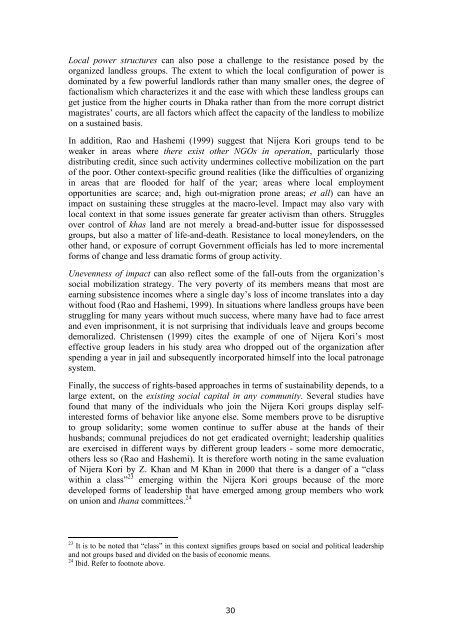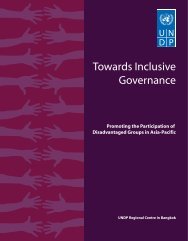Lessons Learned From Rights-Based Approaches in ... - HRBA Portal
Lessons Learned From Rights-Based Approaches in ... - HRBA Portal
Lessons Learned From Rights-Based Approaches in ... - HRBA Portal
Create successful ePaper yourself
Turn your PDF publications into a flip-book with our unique Google optimized e-Paper software.
Local power structures can also pose a challenge to the resistance posed by the<br />
organized landless groups. The extent to which the local configuration of power is<br />
dom<strong>in</strong>ated by a few powerful landlords rather than many smaller ones, the degree of<br />
factionalism which characterizes it and the ease with which these landless groups can<br />
get justice from the higher courts <strong>in</strong> Dhaka rather than from the more corrupt district<br />
magistrates’ courts, are all factors which affect the capacity of the landless to mobilize<br />
on a susta<strong>in</strong>ed basis.<br />
In addition, Rao and Hashemi (1999) suggest that Nijera Kori groups tend to be<br />
weaker <strong>in</strong> areas where there exist other NGOs <strong>in</strong> operation, particularly those<br />
distribut<strong>in</strong>g credit, s<strong>in</strong>ce such activity underm<strong>in</strong>es collective mobilization on the part<br />
of the poor. Other context-specific ground realities (like the difficulties of organiz<strong>in</strong>g<br />
<strong>in</strong> areas that are flooded for half of the year; areas where local employment<br />
opportunities are scarce; and, high out-migration prone areas; et all) can have an<br />
impact on susta<strong>in</strong><strong>in</strong>g these struggles at the macro-level. Impact may also vary with<br />
local context <strong>in</strong> that some issues generate far greater activism than others. Struggles<br />
over control of khas land are not merely a bread-and-butter issue for dispossessed<br />
groups, but also a matter of life-and-death. Resistance to local moneylenders, on the<br />
other hand, or exposure of corrupt Government officials has led to more <strong>in</strong>cremental<br />
forms of change and less dramatic forms of group activity.<br />
Unevenness of impact can also reflect some of the fall-outs from the organization’s<br />
social mobilization strategy. The very poverty of its members means that most are<br />
earn<strong>in</strong>g subsistence <strong>in</strong>comes where a s<strong>in</strong>gle day’s loss of <strong>in</strong>come translates <strong>in</strong>to a day<br />
without food (Rao and Hashemi, 1999). In situations where landless groups have been<br />
struggl<strong>in</strong>g for many years without much success, where many have had to face arrest<br />
and even imprisonment, it is not surpris<strong>in</strong>g that <strong>in</strong>dividuals leave and groups become<br />
demoralized. Christensen (1999) cites the example of one of Nijera Kori’s most<br />
effective group leaders <strong>in</strong> his study area who dropped out of the organization after<br />
spend<strong>in</strong>g a year <strong>in</strong> jail and subsequently <strong>in</strong>corporated himself <strong>in</strong>to the local patronage<br />
system.<br />
F<strong>in</strong>ally, the success of rights-based approaches <strong>in</strong> terms of susta<strong>in</strong>ability depends, to a<br />
large extent, on the exist<strong>in</strong>g social capital <strong>in</strong> any community. Several studies have<br />
found that many of the <strong>in</strong>dividuals who jo<strong>in</strong> the Nijera Kori groups display self<strong>in</strong>terested<br />
forms of behavior like anyone else. Some members prove to be disruptive<br />
to group solidarity; some women cont<strong>in</strong>ue to suffer abuse at the hands of their<br />
husbands; communal prejudices do not get eradicated overnight; leadership qualities<br />
are exercised <strong>in</strong> different ways by different group leaders - some more democratic,<br />
others less so (Rao and Hashemi). It is therefore worth not<strong>in</strong>g <strong>in</strong> the same evaluation<br />
of Nijera Kori by Z. Khan and M Khan <strong>in</strong> 2000 that there is a danger of a “class<br />
with<strong>in</strong> a class” 23 emerg<strong>in</strong>g with<strong>in</strong> the Nijera Kori groups because of the more<br />
developed forms of leadership that have emerged among group members who work<br />
on union and thana committees. 24<br />
23 It is to be noted that “class” <strong>in</strong> this context signifies groups based on social and political leadership<br />
and not groups based and divided on the basis of economic means.<br />
24 Ibid. Refer to footnote above.<br />
30



